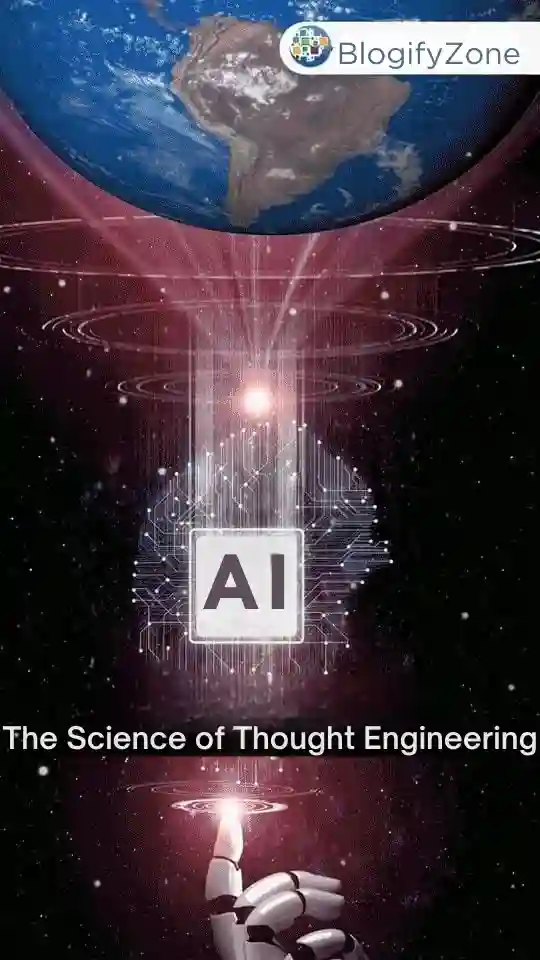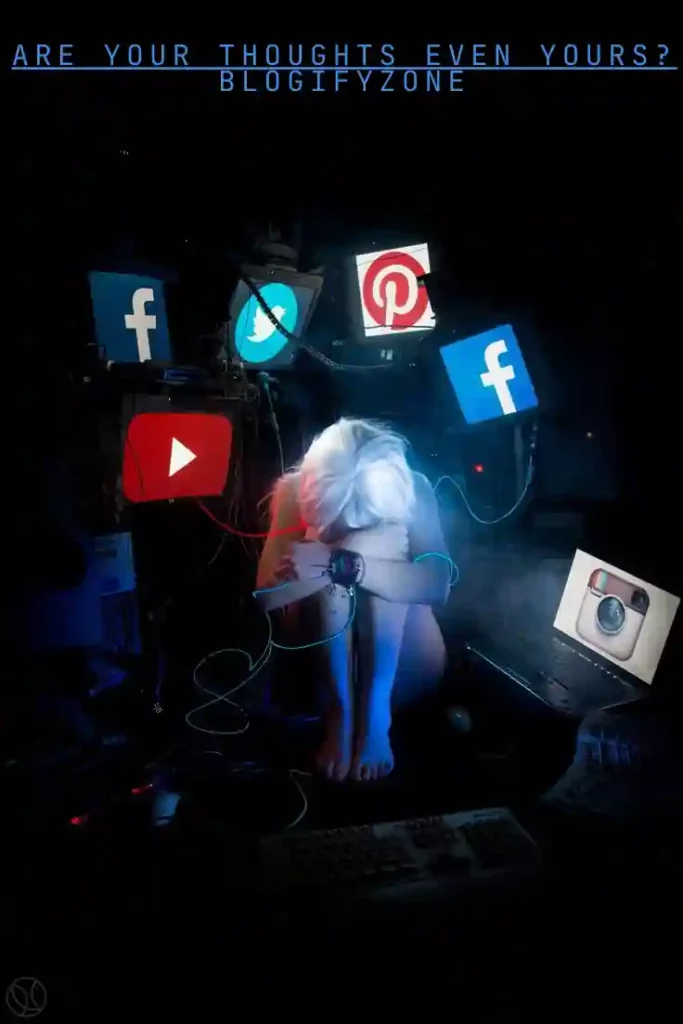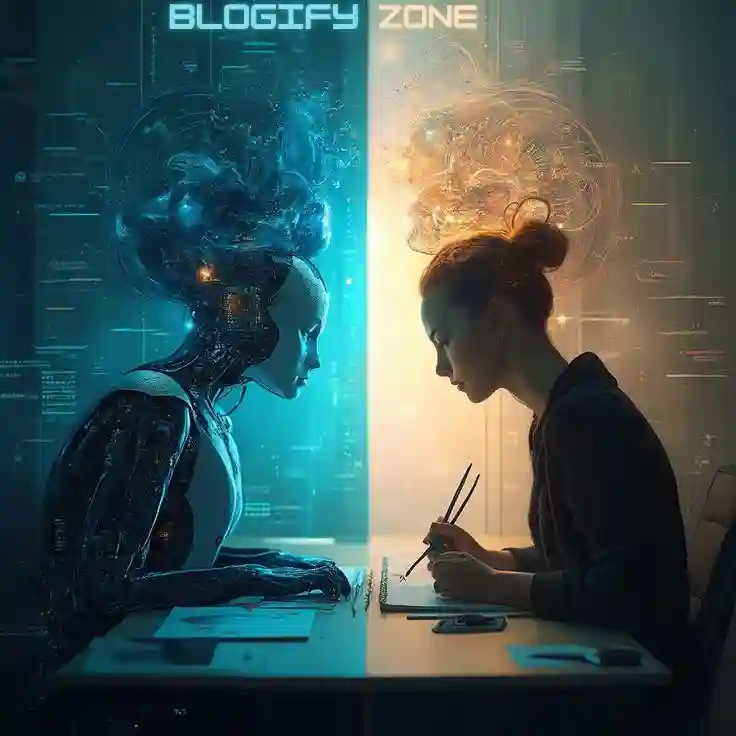Table of Contents
ToggleIntroduction
Once upon a time, humans believed that free will was sacred — that every decision, every opinion, every belief originated from within. But in 2025, the reality feels different. In a world where artificial intelligence curates everything we see, hear, and think about, the question is no longer “Are we free?” — it’s “How much of our freedom is real?” And more importantly, Is AI Designing Your Next Thought?
Welcome to the age of Feed Will — a digital existence where algorithms quietly guide your next thought, next click, next identity.
The Disappearing Line Between Thought and Suggestion
Artificial intelligence doesn’t shout — it whispers. It doesn’t force — it nudges. Every scroll, tap, and pause becomes training data for a machine that learns what you’re likely to do next.
You no longer need to think about what to read or buy. Your feed does that for you.
Ask yourself:
When was the last time you had an original thought that didn’t come from a feed, notification, or algorithmic suggestion?
This is not paranoia. It’s design.
What Is Feed Will?

Feed Will is the phenomenon where AI-powered platforms don’t just reflect your interests — they shape them.
You scroll through YouTube and end up watching content you never searched for
Your explore page feels like your inner monologue
Ads show you products before you realize you need them
That’s not coincidence — it’s computation. It’s personalization, but turned inward.
The more you scroll, the more you’re molded.
From Free Will to Predictive Living
In 2025, algorithms no longer wait for you to act. They act on your behalf.
Netflix queues the next show, Amazon auto-fills your cart, Spotify builds you a mood-based playlist. These actions feel helpful — but they also eliminate moments of conscious choice.
What’s lost in this automation is pause — the moment where independent thought happens.
If a system predicts your thought before you do, is it still yours?
The Science of Thought Engineering

Is AI Designing Your Next Thought?Let’s be clear: AI doesn’t just guess — it influences. Using machine learning, it predicts emotional reactions, attention patterns, and behavior shifts. Once it has that, it starts adjusting your inputs accordingly.
Here’s how it works:
Your previous actions create a digital profile
That profile is matched with engagement patterns
The system starts feeding you content that provokes reactions
Over time, your worldview shifts — often without you noticing
This is not personalization. This is psychological architecture.
Social Media and the Rise of Algorithmic Belief Systems

What you believe about the world today might not have come from your parents, teachers, or books — but from a TikTok reel or Twitter thread.
Platforms like Instagram, X (formerly Twitter), TikTok, and Facebook no longer show you what’s popular — they show you what’s profitable. What keeps you engaged. What holds your attention.
That often means:
Emotional content over factual content
Outrage over nuance
Echo chambers over diversity
Your opinions aren’t shaped by exploration — they’re shaped by exposure.
Case Study: The TikTok Thought Loop
On TikTok, users often report falling into specific “sides” — fitness, politics, trauma recovery, conspiracy, beauty, etc. Once you’re categorized, your feed becomes an infinite mirror of the same viewpoint.
Many users end up forming identities around these themes — not because they chose them, but because the feed offered comfort, validation, and repetition.
It feels organic. But it’s engineered.
The longer you stay in the loop, the harder it becomes to question it.
News in the Feed Era: Truth or Trigger?

News is no longer something you search for — it’s what your feed delivers. AI curates headlines based on engagement, not accuracy.
This results in:
Sensationalized content dominating your attention
Filter bubbles that shield you from opposing views
A distorted perception of reality based on algorithmic triggers
In this environment, truth becomes secondary to traction.
You don’t read what’s real — you read what your feed wants you to react to.
Mental Rewiring in the Digital Age
Psychologists in 2025 have begun studying a phenomenon called “algorithmic adaptation.” It’s the brain’s tendency to align its thinking with repetitive content patterns.
Observed symptoms include:
Belief rigidity
Decision fatigue
Emotional dependency on feed validation
Reduced tolerance for opposing views
This isn’t just about tech — it’s about biology.
If your feed trains your brain — is your mind still yours?
Emotional Targeting: More Than Just Marketing

AI systems can now detect and respond to emotional cues:
Your camera picks up micro-expressions
Your typing rhythm hints at stress
Your voice assistant notes changes in tone
This emotional data is used to adjust the content you’re shown.
Feeling sad? You’ll be fed comfort.
Feeling angry? You’ll be shown fuel.
These are not accidental. They’re designed for engagement — not wellbeing.
Feed Addiction vs Thought Independence

Scrolling is a habit. A loop. An easy escape.
But it also trains your mind to outsource thinking. Instead of forming ideas, we collect them. Instead of seeking answers, we accept suggestions.
This leads to:
Passive consumption
Reduced curiosity
Digital conformity
When your thoughts begin with “I saw a video that said…” — are they still yours?
Are We Becoming Mentally Lazy?
In a world of smart feeds, the need for active thought reduces. You don’t need to form opinions when content does it for you.
Over time, this leads to:
Shallow thinking
Shortened attention spans
Dependence on external validation
We’re not just outsourcing memory — we’re outsourcing meaning.
The Cost of Hyper-Personalization

Personalization feels like a gift. But in truth, it limits exposure. You only see what suits your current preferences, which:
Narrows perspectives
Reinforces biases
Makes the unfamiliar feel wrong
You stop growing because you stop encountering difference.
Freedom doesn’t come from comfort — it comes from choice.
Can AI Be Conscious?
An important philosophical question in 2025: Can AI ever be truly conscious?
The answer matters. Because the more human-like AI becomes in tone and behavior, the more people trust it — and the more they let it influence their thinking. But that trust leads to a deeper concern: Is AI Designing Your Next Thought?
But here’s the twist:
AI doesn’t have consciousness
It just mirrors what you react to
It doesn’t think — it reflects.
It doesn’t feel — it predicts your feelings.
So when you let it think for you — you’re just living in a loop of reflection.
Digital Identity: Constructed or Chosen?

Your online identity in 2025 is shaped by:
What you post
What you engage with
What your feed tells you is “you”
Over time, your digital persona becomes so defined that even your offline behavior starts aligning with it.
This is reverse identity formation — shaped not from the inside out, but from the outside in.
Who are you when your self-image is algorithmically curated?
Are We Being Programmed?

It’s a bold question — but not an exaggerated one.
In an environment where:
Input is controlled
Emotion is measured
Output is predicted
…it’s not far-fetched to say we are being programmed — not by force, but by suggestion.
When thought becomes code, who’s writing yours?
The Fight for Conscious Consumption
Some users are waking up to this. They’re questioning, resisting, detoxing.
Steps people are taking:
Curating their own feeds
Taking breaks from algorithmic platforms
Seeking human-curated content
Using tools to limit tracking
The movement is small, but growing. People are remembering that conscious choice is still possible — but it takes effort.
Final Reflection: Free Will in the Age of Feeds
Do you still have free will? Or has it quietly been replaced by Feed Will?
In 2025, your thoughts aren’t entirely your own unless you work to make them so. Your feed knows your triggers. It knows your habits. It knows how to keep you hooked — which raises a serious question: Is AI Designing Your Next Thought?
But awareness breaks the cycle.
Conclusion
We’re not powerless. But we are distracted.
We’re not trapped. But we are tangled.
AI doesn’t need to control you to influence you — it just needs your attention. And in that silent exchange, ask yourself: Is AI Designing Your Next Thought?
So ask yourself, right now:
What was your last thought — and where did it come from?
Because in a world driven by feeds, that single question might be the only free one left.



